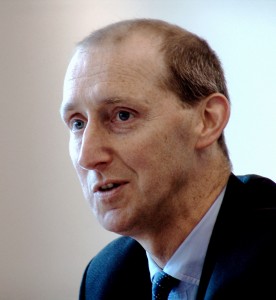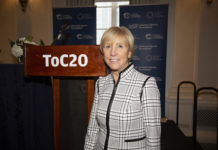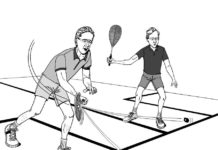For nearly two decades events in the Middle East have constantly been in the headlines, and unfortunately those headlines are very rarely positive. But, two recent headlines gave squash fans and players reason to celebrate in a huge way. First, it was announced: “The PSA Celebrates Record Multi-Year Agreement in Kuwait.” The 2007 Kuwait Open, in April, together with the 2008 Kuwait Open, will be elevated to Super Series Platinum status—each offering prize-funds of $172,500—with the climax of the three-year deal being the 2009 World Open Championship, which will boast $250,000 in prize money.
 Gawain Briars, Chief Executive of the Professional Squash Association, said, “The PSA is truly indebted to Sheikha Fadyah Al Sabah, (a daughter of the Kuwaiti royal family) for providing the vision and generosity in presenting this opportunity to the world of squash. Her achievement single-handedly lifts the standards for all to follow. Her efforts on behalf of Kuwait are enormous.”
Gawain Briars, Chief Executive of the Professional Squash Association, said, “The PSA is truly indebted to Sheikha Fadyah Al Sabah, (a daughter of the Kuwaiti royal family) for providing the vision and generosity in presenting this opportunity to the world of squash. Her achievement single-handedly lifts the standards for all to follow. Her efforts on behalf of Kuwait are enormous.”
Just over a week after that announcement was made, another headline appeared: “PSA Celebrates Historic Million Dollar Saudi Agreement with Ziad Al-Turki.” Al-Turki, promoter of the Saudi International, confirmed a five-year deal with the PSA to present four Super Series Platinum tournaments (in 2007, 2008, 2009 and 2011)—each with total minimum prize funds of $182,500—with the 2010 Men’s World Open worth a minimum of $322,500.
“This has been a tumultuous last few days for professional squash,” Briars said. “The Middle East has clearly signaled its intention to drive up standards in the game by presenting the biggest tournaments in the world in memorable venues appreciated by both players and audiences.”
World No. 1 and winner of last year’s Saudi International, Egyptian Amr Shabana, is thrilled with the recent announcement. “It’s great that there are better events, especially in the Middle East because we get more exposure. It is only fair that squash grows in this part of the world, as the shift has gone to the Middle East lately, from the juniors up to the men,” he said. “Squash still has a long way to go to get where it is supposed to. We need the growth back in Europe, as in recent years the events in Europe have dropped heavily.”




